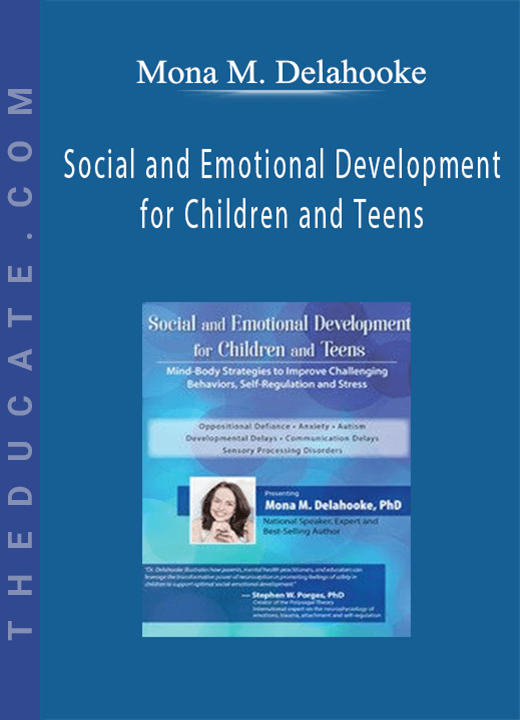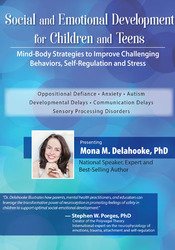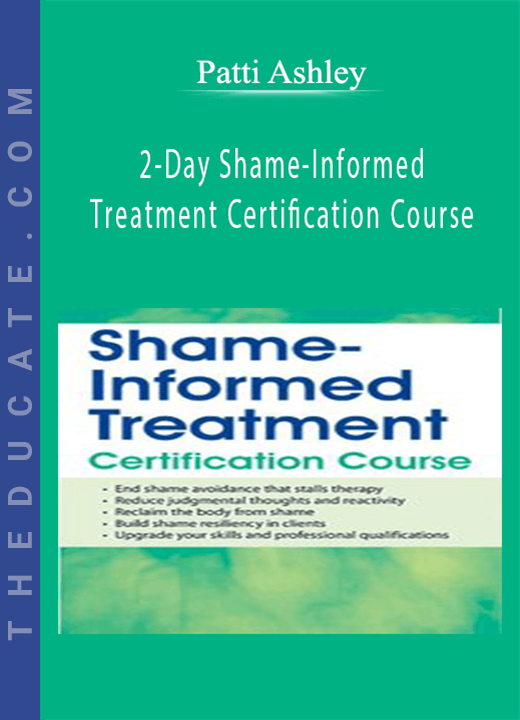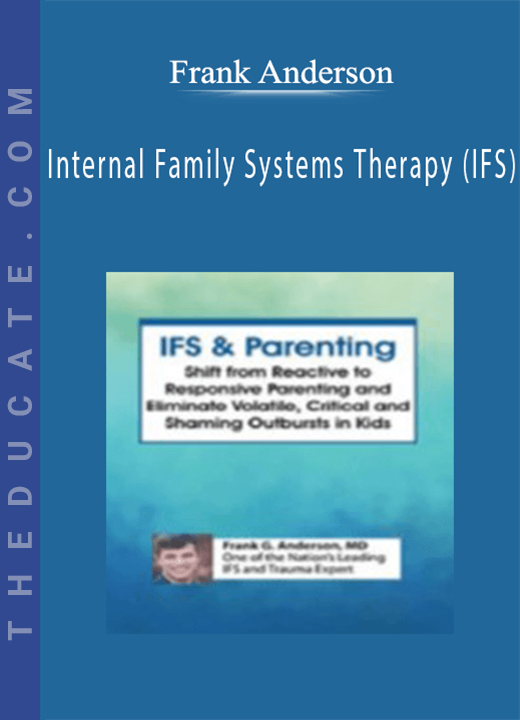Description
Mona Delahooke – Social and Emotional Development for Children and Teens: Mind-Body Strategies to Improve Challenging Behaviors, Self-Regulation and Stress
- Faculty:
- Mona Delahooke, PhD
- Duration:
- 5 Hours 50 Minutes
- Format:
- Audio and Video
- Copyright:
- Mar 06, 2018
Description
Through clear, straightforward steps, guiding principles and mind-body techniques backed by neuroscience and research, Mona Delahooke, PhD, will teach you practical methods to better support the social and emotional lives of the children and families you work with.
Watch this cutting-edge seminar and you will learn valuable tools to nurture relationships, measure progress, reduce child stress, address challenging behaviors and promote self-regulation. Through case studies, video examples, and dynamic discussion you will learn how and when to use specific treatment techniques based on each child’s unique individual emotional, sensory/motor and developmental profile.
Discover how to customize treatment and educational strategies across disciplines through a mind/body and user-friendly roadmap of social and emotional development applicable to:
- Oppositional Defiance
- Challenging behaviors
- Anxiety
- Depression
- Autism
- Mental health issues
- Developmental delays
- Communication delays
- Sensory Processing disorders
This workshop will show how to develop these skills in children and teens with clear, practical and attuned strategies to guide you to harness strength and hope in garnering psychological resilience for children and families.
Handouts
| Manual (5.58 MB) | 77 Pages | Available after Purchase |
| Larger Slides (11.11 MB) | 81 Pages | Available after Purchase |
Outline
- Foundations for Social-Emotional Treatment
- Difference between developmental and chronological age and clinical/educational implications
- Neuroception—Polyvagal Theory (Stephen Porges, Ph.D.)
- The therapeutic “use of self”
- Difference between purposeful misbehavior and stress responses
- Parent-child and provider-parent relationships
- Promote a calm and alert state
- Strategies Tailored to Individual Differences
- Conscious vs unconscious behaviors
- Identify underlying challenges
- Work at each person’s neurodevelopmental level
- Identify the behavioral features of stress responses and how to support in real time
- Treat functional capacities/challenges across diagnoses
- Three steps to personalized attunement
- Mind-Based Techniques for Regulation, Attention and Engagement
- Sensorimotor contributions to physiological regulation
- Establish the neuroception of safety as the priority
- Auditory and other sensory pathways to support physiological and emotional regulation
- Play techniques for pre-symbolic development
- Powerful wordless dialogues
- Non-verbal social problem solving
- Body-Based Techniques for Social Problem-Solving, Executive Function and Cognitive Flexibility
- Communicative flow
- Build symbolic bridges
- Re-enactment of procedural memories and how to debrief
- Availability to use “mind” to control body
- Integrate mind/body strategies
- Techniques for Autism Spectrum Disorder
- Behavioral, developmental and hybrid approaches—how to choose
- Floortime®, DIR and FCD, and developmental, relationship-based techniques
- Behavioral and developmental techniques
- Alternative forms of communication for non-speakers
- Lessons about neurodiversity and avoiding ableism
- Techniques for Communication Delays
- Non-verbal communication
- Affect/emotion harnessing techniques
- Promote intentional communication with caregiver
- How to combine words, affect and action
- Techniques for Challenging Behaviors
- Deconstruct oppositional defiant disorder
- Determine upstream causes of challenging behaviors
- Use the child’s natural sensory preferences for cooperation
- Stress responses and faulty neuroception
- Support adaptive responses to emotional dysregulation
- Techniques for Anxiety, Stress and Trauma
- Identify stress responses as early as possible
- Emotional co-regulation and modulation strategies
- Build symbolic pathways through story telling
- Explore fears through procedural re-enactment
- Partner with parents
Faculty

Mona Delahooke PhD Related seminars and products: 5
Mona Delahooke, Ph.D., is a licensed clinical psychologist with more than 25 years of experience caring for children, teenagers, and their families.
Dr. Delahooke holds the highest level of endorsement in the field of infant and toddler mental health in California, as a Reflective Practice Mentor (RPM). With a special focus on early childhood development, she is a senior faculty member of the Profectum Foundation, an organization dedicated to advancing our understanding and support of neurodiverse children, adolescents and adults. She trains clinicians in the Los Angeles Department of Mental Health (DMH) as an independent contractor. Currently in private practice in Los Angeles, California, Dr. Delahooke consults with parents, preschools, regional centers, public agencies, and school districts in the areas of screening, assessment, intervention and support for families, infants, toddlers and children. She is the author of Social and Emotional Development in Early Intervention (PESI, 2017), and the award-winning Beyond Behaviors: Using Brain Science to Understand and Solve Children’s Behavioral Challenges,(PESI, 2019), which describes a contemporary, neurodevelopmental approach useful for all childhood professionals.
Speaker Disclosures:
Financial: Mona Delahooke maintains a private practice. She is a senior faculty member of the Profectum Foundation. Dr. Delahooke receives a speaking honorarium from PESI, Inc.
Non-financial: Mona Delahooke has no relevant non-financial relationship to disclose.







5 reviews for Social and Emotional Development for Children and Teens: Mind-Body Strategies to Improve Challenging Behaviors, Self-Regulation and Stress – Mona M. Delahooke
There are no reviews yet.